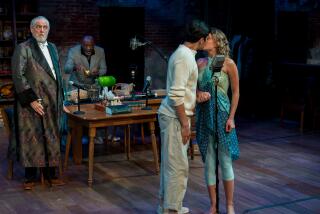‘Tempest’: Parody in Neo-Kabuki Clothing
- Share via
Kabuki was born in 1603, the same year Elizabeth I died and Shakespeare’s company gained patronage from the new king. Japanese and British popular theater had much in common then, and attempts to bring the two closer have preoccupied many theater and opera directors in this century.
However, the Hanagumi Shibai company’s production of “The Tempest” at the Japan America Theatre on Saturday was after bigger game than merely imposing a traditional Japanese theatrical style on a masterwork from another culture. As directed by Kano Yukikazu, who also played the newly padded role of Ferdinand, this “neo-Kabuki performance” offered an outrageous parody of Grand Kabuki’s most cherished conventions.
Think of the Flying Karamazov Brothers’ “Comedy of Errors” fused with Les Ballets Trockadero de Monte Carlo in high cultural drag and you’ll get some idea of what Yukikazu called “The Dismantlement of Kabuki” on view in this Japanese-language version.
With a deadpan simultaneous translation supplied by Faith Bach over rented headphones, “The Tempest--Arashi nochi Hare” offered scenes and characters Shakespeare never wrote, countless songs and dances--including Peking Opera and Filipino singkil--plus comic anachronisms galore.
The costumes by Abe Akemi provided their own Kabuki lampoon--starting with a classic formal kimono perfectly rendered in tan wide-wale corduroy. Or the actors’ traditional crests sporting such pictograms as sunglasses and rugby balls.
Ariel (Sato Chikau) and his assistants emerged as the major characters here, with Prospero’s (Harakawa Hiroaki) renunciation of revenge--and his relationship with Miranda (Yamashita Yoshiaki)--generating no impact whatsoever. Kabuki can be profound. And subtle. And complex. But Yukikazu remained too intent on Kabuki parody to show us those qualities.
A pity. In Jiri Trnka’s 1955 puppet film of “A Midsummer Night’s Dream,” there’s a scene Shakespeare never wrote in which the absurdities of the “Pyramus and Thisbe” playlet vanish under Puck’s cruelest magic and tragedy is suddenly, unexpectedly invoked. Had Yukikazu taken that kind of risk, he might have created a genuine Shakespearean experience instead of a delirious diversion memorable for everything except interpretation of the play.
However, he schooled his company to a reasonable approximation of Kabuki skills, and his bold acting style made the evil aristocrats (Yashiro Shin’ichi and Misushita Kiyoshi) as entertaining as the comic servants (Nakawaki Mikito and Oi Yasuhiko). If Caliban (Katsura Ken’ichi) had no stature and no poignancy, that’s one more disappointment in this version.
More to Read
The biggest entertainment stories
Get our big stories about Hollywood, film, television, music, arts, culture and more right in your inbox as soon as they publish.
You may occasionally receive promotional content from the Los Angeles Times.










